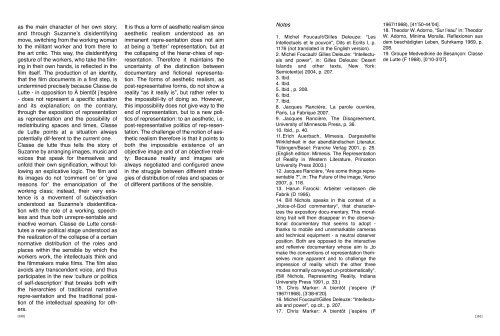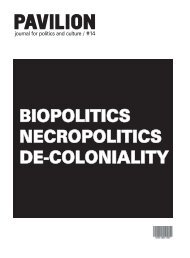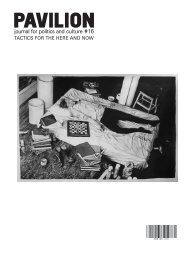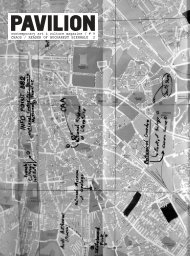PAVILION
PAVILION
PAVILION
- No tags were found...
Create successful ePaper yourself
Turn your PDF publications into a flip-book with our unique Google optimized e-Paper software.
as the main character of her own story;<br />
and through Suzanne’s disidentifying<br />
move, switching from the working woman<br />
to the militant worker and from there to<br />
the art critic. This way, the disidentifying<br />
gesture of the workers, who take the filming<br />
in their own hands, is reflected in the<br />
film itself. The production of an identity,<br />
that the film documents in a first step, is<br />
undermined precisely because Classe de<br />
Lutte - in opposition to À bientôt j’espère<br />
- does not represent a specific situation<br />
and its explanation; on the contrary,<br />
through the exposition of representation<br />
as representation and the possibility of<br />
redistributing spaces and times, Classe<br />
de Lutte points at a situation always<br />
potentially dif-ferent to the current one.<br />
Classe de lutte thus tells the story of<br />
Suzanne by arranging images, music and<br />
voices that speak for themselves and<br />
unfold their own signification, without following<br />
an explicative logic. The film and<br />
its images do not ‘comment on’ or ‘give<br />
reasons for’ the emancipation of the<br />
working class; instead, their very existence<br />
is a movement of subjectivation<br />
understood as Suzanne’s disidentification<br />
with the role of a working, speechless<br />
and thus both unrepre-sentable and<br />
inactive woman. Classe de Lutte constitutes<br />
a new political stage understood as<br />
the realization of the collapse of a certain<br />
normative distribution of the roles and<br />
places within the sensible by which the<br />
workers work, the intellectuals think and<br />
the filmmakers make films. The film also<br />
avoids any transcendent voice, and thus<br />
participates in the new ‘culture or politics<br />
of self-description’ that breaks both with<br />
the hierarchies of traditional narrative<br />
repre-sentation and the traditional position<br />
of the intellectual speaking for others.<br />
[160]<br />
It is thus a form of aesthetic realism since<br />
aesthetic realism understood as an<br />
immanent repre-sentation does not aim<br />
at being a ‘better’ representation, but at<br />
the collapsing of the hierar-chies of representation.<br />
Therefore it maintains the<br />
uncertainty of the distinction between<br />
documentary and fictional representation.<br />
The forms of aesthetic realism, as<br />
post-representative forms, do not show a<br />
reality “as it really is”, but rather refer to<br />
the impossibil-ity of doing so. However,<br />
this impossibility does not give way to the<br />
end of representation, but to a new politics<br />
of representation: to an aesthetic, i.e.<br />
post-representative politics of rep-resentation.<br />
The challenge of the notion of aesthetic<br />
realism therefore is that it points to<br />
both the impossible existence of an<br />
objective image and of an objective reality:<br />
Because reality and images are<br />
always negotiated and configured anew<br />
in the struggle between different strategies<br />
of distribution of roles and spaces or<br />
of different partitions of the sensible.<br />
Notes<br />
1. Michel Foucault/Gilles Deleuze: “Les<br />
Intellectuels et le pouvoir”, Dits et Ecrits I, p.<br />
1176 (not translated in the English version).<br />
2. Michel Foucault/ Gilles Deleuze: “Intellectuals<br />
and power”, in: Gilles Deleuze: Desert<br />
Islands and other texts, New York:<br />
Semiotext(e) 2004, p. 207.<br />
3. Ibid.<br />
4. Ibid.<br />
5. Ibid., p. 208.<br />
6. Ibid.<br />
7. Ibid.<br />
8. Jacques Rancière, La parole ouvrière,<br />
Paris, La Fabrique 2007.<br />
9. Jacques Rancière, The Disagreement,<br />
University of Minnesota Press, p. 36.<br />
10. Ibid., p. 40.<br />
11.Erich Auerbach, Mimesis. Dargestellte<br />
Wirklichkeit in der abendländischen Literatur,<br />
Tübingen/Basel: Francke Verlag 2001, p. 25.<br />
(English edition: Mimesis. The Representation<br />
of Reality in Western Literature, Princeton<br />
University Press 2003.)<br />
12. Jacques Rancière, “Are some things representable<br />
?”, in: The Future of the image, Verso<br />
2007, p. 118.<br />
13. Harun Farocki: Arbeiter verlassen die<br />
Fabrik (D 1995).<br />
14. Bill Nichols speaks in this context of a<br />
„Voice-of-God commentary“, that characterizes<br />
the expository docu-mentary. This moralizing<br />
trait will then disappear in the observational<br />
documentary that seems to adopt -<br />
thanks to mobile and unremarkable cameras<br />
and technical equipment - a neutral observer<br />
position. Both are opposed to the interactive<br />
and reflexive documentary whose aim is „to<br />
make the conventions of representation themselves<br />
more apparent and to challenge the<br />
impression of reality which the other three<br />
modes normally conveyed un-problematically“.<br />
(Bill Nichols, Representing Reality, Indiana<br />
University Press 1991, p. 33.)<br />
15. Chris Marker: A bientôt j’espère (F<br />
1967/1968), [3’38-6’20].<br />
16. Michel Foucault/Gilles Deleuze: “Intellectuals<br />
and power”, op.cit., p. 207.<br />
17. Chris Marker: A bientôt j’espère (F<br />
1967/1968), [41’50-44’04].<br />
18. Theodor W. Adorno, “Sur l’eau” in: Theodor<br />
W. Adorno, Minima Moralia. Reflexionen aus<br />
dem beschädigten Leben, Suhrkamp 1969, p.<br />
208.<br />
19. Groupe Medvedkine de Besançon: Classe<br />
de Lutte (F 1968), [0’10-3’07].<br />
[161]








